Mississippi Today
Gov. Tate Reeves cost taxpayers at least $31,000 in questionable state airplane trips
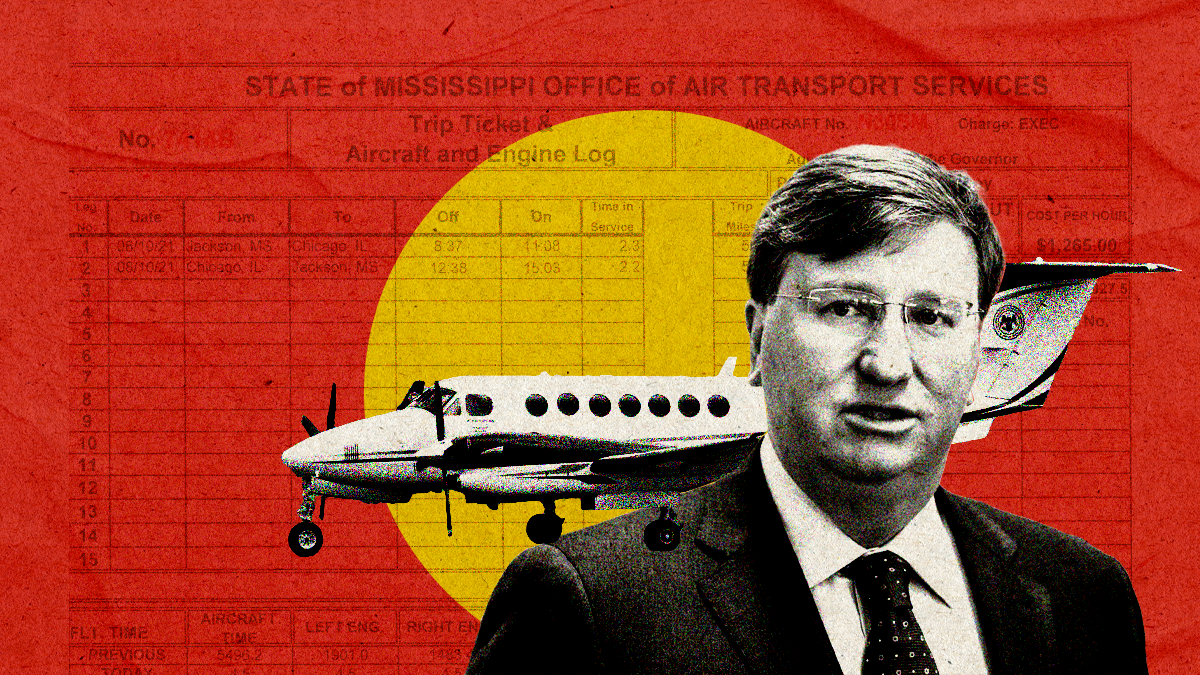
Gov. Tate Reeves, in his first term as governor, used at least $31,000 in taxpayer funds to take trips on Mississippi’s state airplane to political events that don’t appear to directly involve state business, according to a review of flight records and the governor’s social media posts.
The trips in question range from taking the plane to attend partisan gatherings hosted by groups that have donated more than $1 million to Reeves’ campaigns to overlapping state business with campaign fundraising efforts.
The state’s Office of Air Transport Services allows the governor, other statewide officials and agency leaders to use the airplane for official state business. The purpose of the state aircraft is for a state employee to conduct business on behalf of Mississippi or to benefit the state, according to a policy listed on the Department of Finance and Administration’s website.
While that loosely worded policy does not define official business or include examples of what type of travel is prohibited, the use of the state plane has long been scrutinized by elected officials and the press.
Before he was elected governor, Reeves was among those who raised questions about expensive taxpayer-funded trips. In a 2013 hearing, when Reeves was lieutenant governor and chairman of the Joint Legislative Budget Committee, he highlighted questionable state plane trips to publicly question a policy at the time that gave state agency heads more flexibility in how tax dollars were spent.
“What we are now trying to determine is, has that flexibility been good for the taxpayers or has it been not so good for the taxpayers?” Reeves said at the time.
Since he was elected governor, however, Reeves used the plane for trips that could fall under similar scrutiny. As governor, not only does he have first dibs for plane usage, but he also leads the agency, DFA, that manages the use of the state aircraft.
Mississippi Today analyzed thousands of pages of flight records, obtained through a public records request, that span from January 2020, when Reeves took office as governor, through June 2023.
Several trips, most of which have not previously been reported, raise questions about how the governor has used the taxpayer-owned plane, the rules surrounding the usage of the plane, and whether the governor used the aircraft for political purposes.
Communications officials at DFA did not respond to specific questions from Mississippi Today on whether the agency has an independent process to review if the governor is using the aircraft for official business.
Corey Custer, deputy chief of staff to Reeves, defended the trips in a Wednesday statement to Mississippi Today, saying they were “absolutely appropriate uses of the governor’s time and resources.”
“These (trips) are important to advancing the interests of our state and implementing a conservative agenda that has helped make Mississippi stronger than ever before,” Custer said. “Mississippians want somebody who will fight to defend their way of life and advance principled policy ideas, and that’s what Governor Reeves will continue to do.”
Reeves flies to CPAC
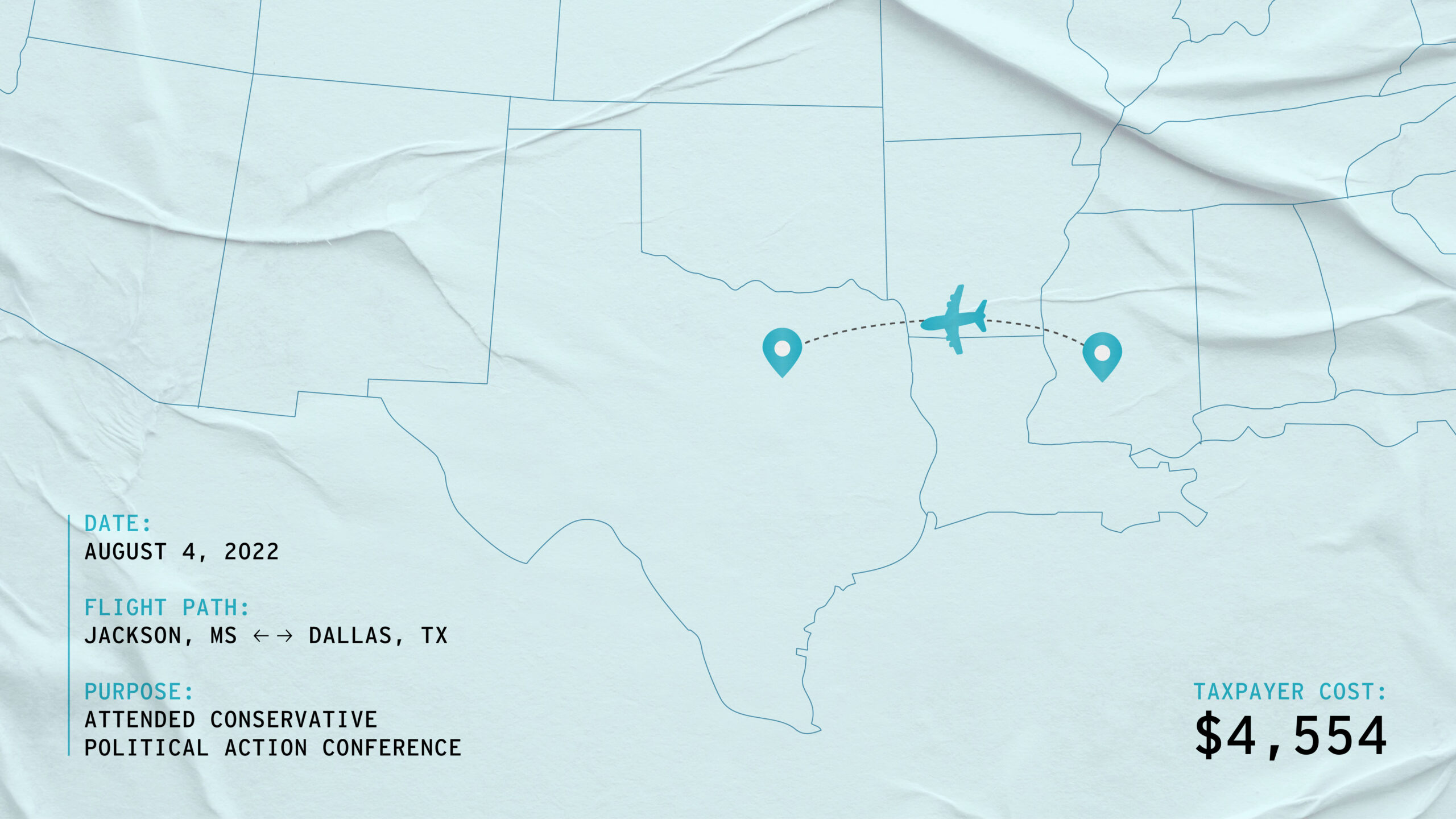
In August 2022, Reeves used the state plane to travel to the Conservative Political Action Conference, an openly partisan organization that lobbies for conservative causes.
Pilots flew the plane without any passengers from Jackson to Hattiesburg on Aug. 4, 2022, where they picked up Reeves, one of his daughters and Custer, the governor’s communications staffer. The three ate catered food aboard the aircraft and traveled from Hattiesburg to Dallas for the CPAC conference. They stayed in Dallas overnight and returned to Jackson the next day at a cost of $4,554 in taxpayer funds.
At the conference, the governor blistered Democrats, who had control of both chambers of Congress and the White House, for how they handled the nation’s economy.
“Inflation is at a 40-year high, and everybody’s paying more,” Reeves said at the event.
But before Reeves decried liberals making average citizens pay more for goods and services, he had used taxpayer dollars to attend at least three partisan events within the previous few months.
Flights to Republican Governors Association events
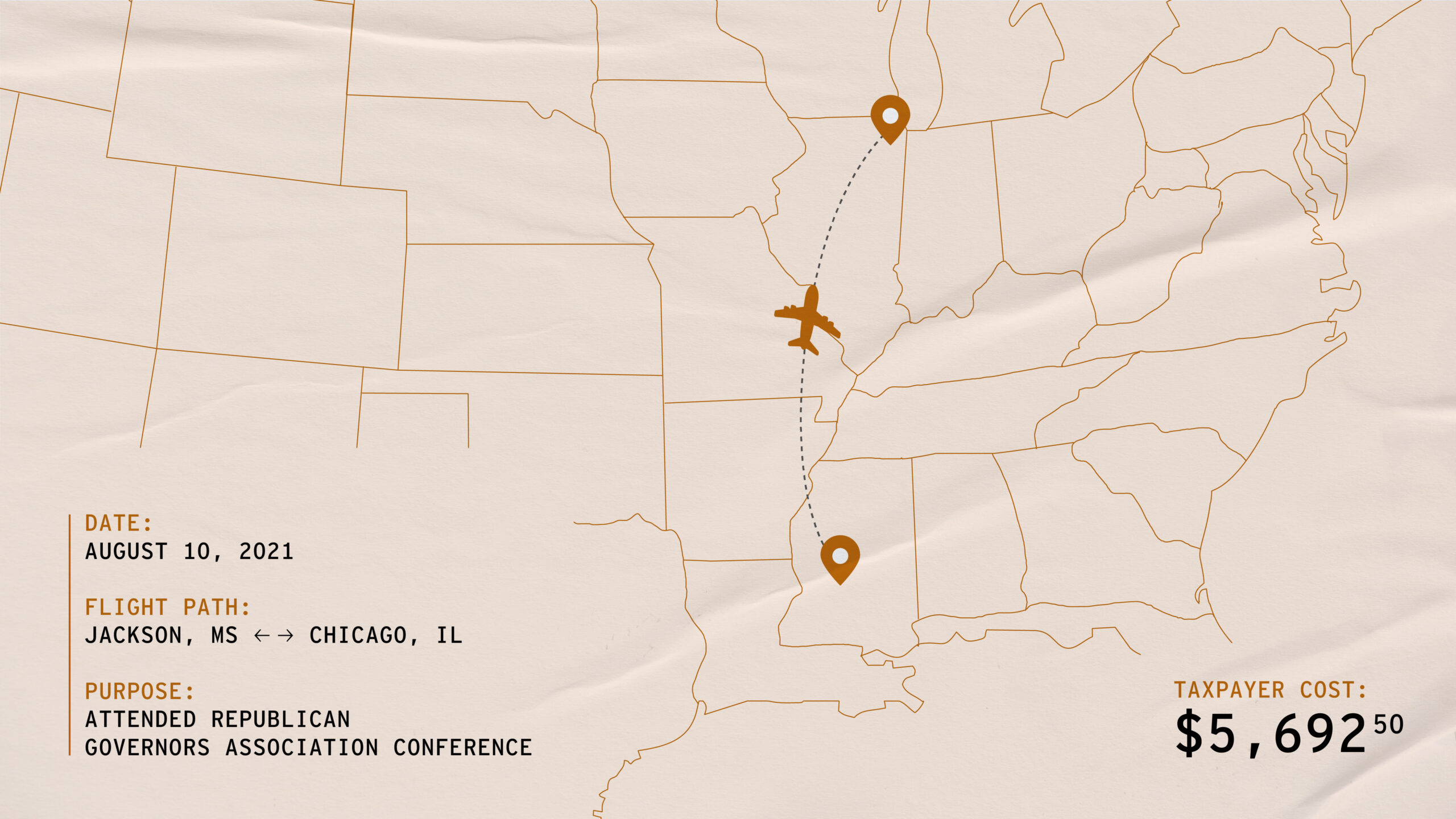
The governor appears to have used the plane three separate times on May 25, 2021; Aug. 10, 2021; and May 23, 2022; to attend Republican Governors Association events around the country, costing taxpayers a total of $13,245.
His August 2021 trip occurred when hospitals around the state were struggling with an influx of COVID-19 cases. Lee McCall, a Neshoba County hospital administrator, publicly pleaded for the governor’s help to deal with the surge in cases.
“Hospitals and healthcare workers need you to help us,” McCall wrote about Reeves. “Where are you?”
Reeves’ office told the Clarion Ledger at the time that he flew to Chicago on a commercial flight, and prior to the conference, he was out of the state for a personal trip with his family.
While he may have used a commercial flight to travel to Chicago, the location of the RGA conference, taxpayers still paid $5,692 for the aircraft to travel from Jackson to Chicago to pick up Reeves and his family from the conference before returning them back to the state.
Unlike the bipartisan National Governors Association where policy is often discussed, the main description leading the homepage of the RGA’s website says, “The RGA helps elect Republican governorships throughout the nation.”
The RGA has also been one of Reeves’ biggest contributors. The organization dumped over $1.8 million into his 2019 campaign for governor, and it is widely expected to write more large checks to his campaign during the current election cycle.
Reeves did not promote the May 2021 and May 2022 RGA conferences on any of his social media accounts, and there do not appear to be any records available to independently confirm if the RGA events were the sole reason for the governor’s trip.
However, the RGA notes in a press release on its website that several governors were speaking to a radio host on May 27, 2021, as part of its “spring policy conference” in Nashville, the same time that Reeves was also there.
South Carolina Gov. Henry McMaster also noted on his 2022 public schedule he was attending an RGA conference on May 24 through May 26, confirming that there was an RGA conference when Reeves used the state plane to travel there.
Reeves flies to national anti-abortion group events
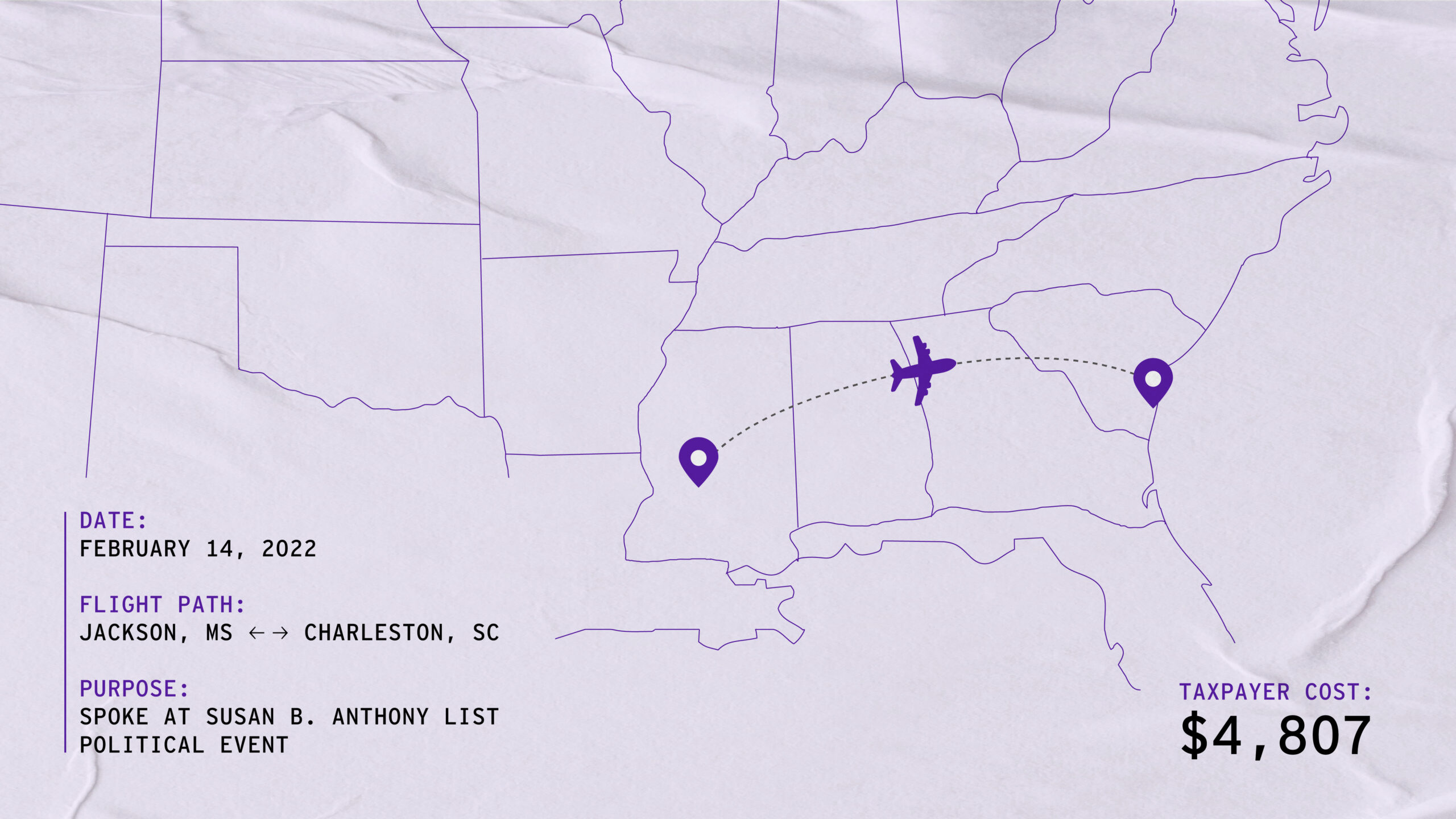
Reeves used the airplane on the public’s dime on Feb. 14, 2022, and Oct. 4, 2022, to attend events for the Susan B. Anthony List, a nonprofit organization that combines “politics with policy” by working to advance pro-life laws through “direct lobbying and grassroots campaigns.”
Custer accompanied the governor on the Valentine’s Day trip to Charleston, South Carolina, which cost taxpayers $4,807. The plane records list a “speaking engagement” as the reason for the flight.
The governor promoted his appearance at the February event on social media, saying it was great “meeting and praying with so many of our allies at the Susan B. Anthony List Pro-Life Leaders Summit.”
“Together, we’re going to save millions of babies and ensure expecting mothers receive the quality care that they deserve,” Reeves wrote.
The governor’s campaign that same weekend also recorded spending $305 of his own donations on “travel expenses” to pay for a hotel room at Kiawah Island Golf Resort, the location of the SBA conference. But the hotel later refunded the room to the campaign, according to his campaign’s filings with the Secretary of State’s office.
It’s unclear why his campaign, at least initially, paid for a hotel room at the conference or why the hotel refunded the payment. Reeves’ office did not address questions seeking to clarify the use of campaign funds.
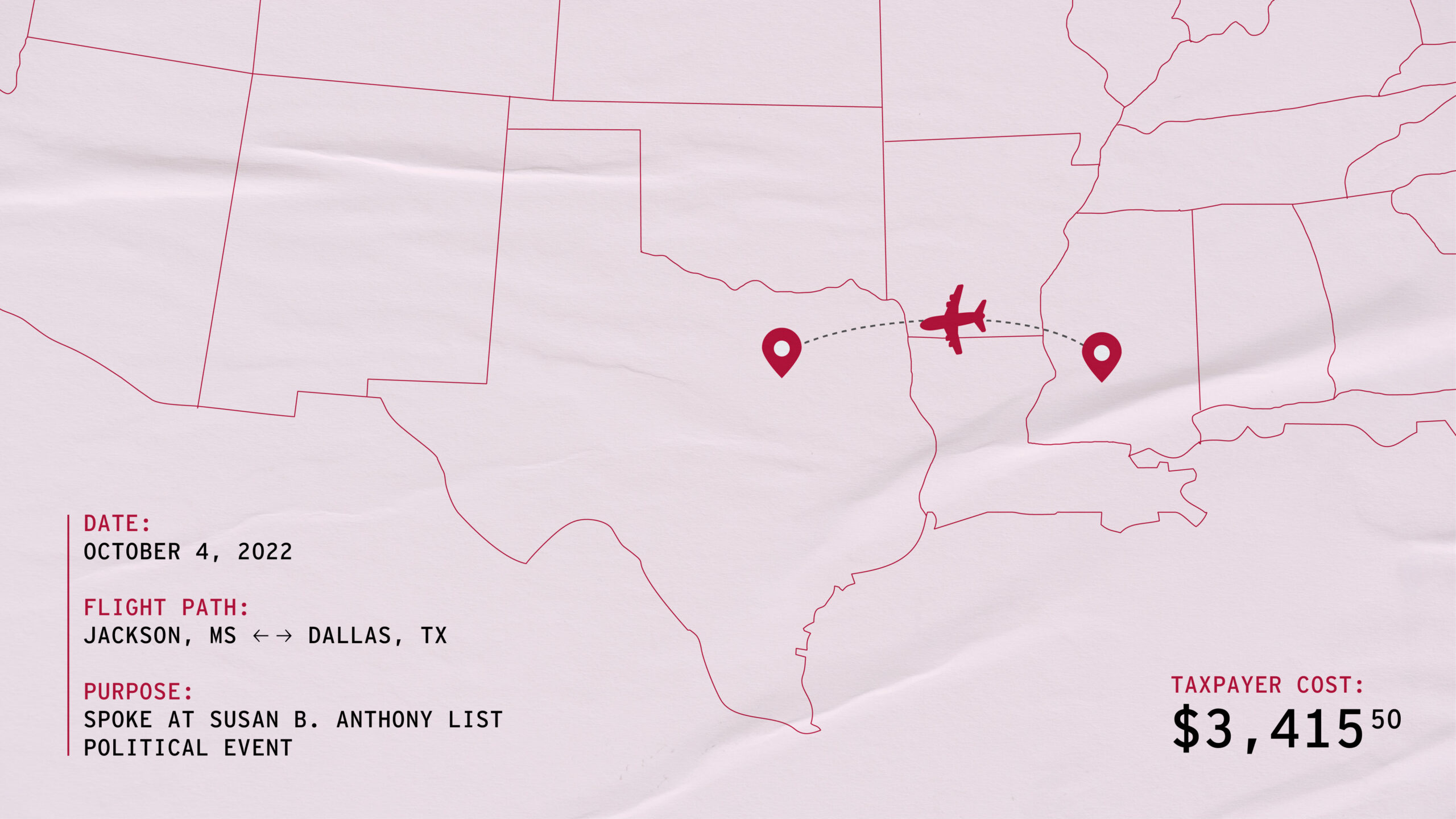
The governor also used the plane on Oct. 4, 2022, to travel to another SBA List event in Dallas for a “speaking engagement,” which cost taxpayers $3,415. The governor, again, touted the trip on social media.
SBA’s PAC donated $2,500 to the governor’s campaign on Oct. 13, 2022, and the organization has endorsed his bid for reelection. The Mississippi Republican Party has publicly touted that endorsement.
Reeves flies to Florida for Fox News town hall
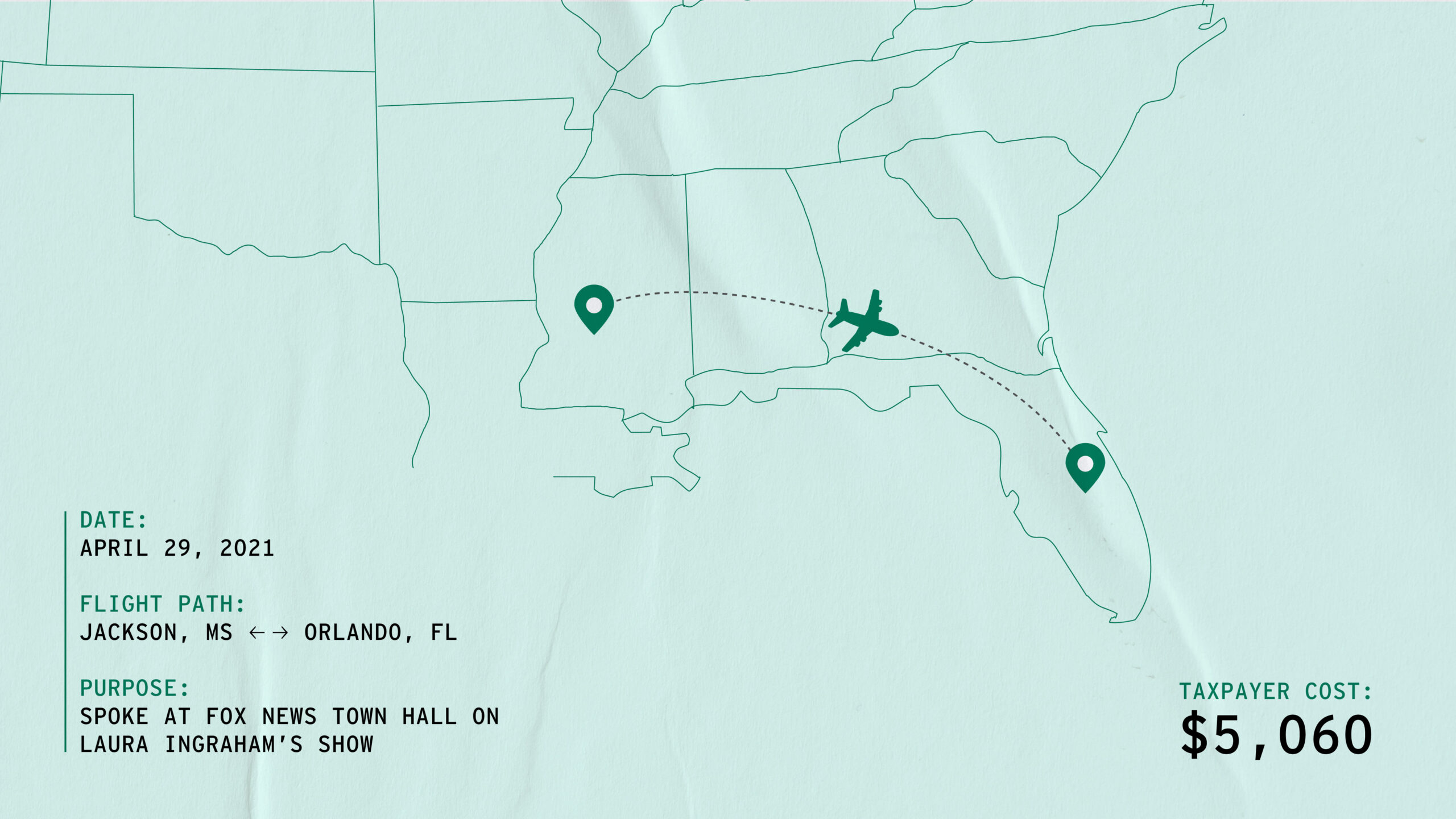
On April 29, 2021, Reeves chartered the state plane to travel to Orlando, Florida, where he participated in a “Red State Trailblazers Town Hall” with Fox News host Laura Ingraham.
A Reeves aide accompanied the governor on the Orlando trip for a cost of $5,060, where catered food was also provided to the two.
Reeves joined Texas Gov. Greg Abbott, Florida Gov. Ron DeSantis, Iowa Gov. Kim Reynolds and Nebraska Gov. Pete Ricketts for the town hall with Ingraham to discuss the COVID-19 pandemic and other political issues.
During one portion of the interview, Ingraham played a clip of President Joe Biden’s 2021 State of the Union speech, where he called on Congress to address systemic racism in the country. The Fox News host asked Reeves to respond.
Reeves said he did not believe systemic racism exists in America. As evidence, he touted that while the nation was dealing with a wave of protests over police brutality after the murder of George Floyd, Mississippi experienced no violent protests. He attributed this to Mississippians’ pro-law enforcement sentiments.
“We’re not trying to defund the police like the far left, we’re actually investing in our police because we know we’re indebted to them for keeping our communities safe,” Reeves said.
It’s common for public officials, including the governor, to give interviews to news outlets. But during his governorship, Reeves has commonly granted interviews to national news outlets like NBC, CNN, CBS and ABC via Zoom.
In-state plane trips paired with campaign fundraisers
The first-term governor also appears to have used the state plane at least 10 times to mix fundraising events with official state business, according to a review of social media posts, plane records and campaign finance reports.
While not explicitly prohibited in DFA policy, the governor’s travel habits reveal how closely his official duties have been linked with political fundraising.
For example, Reeves’ office on Oct. 5, 2022, requested to use the plane on Oct. 12-13 of that year for a “speaking engagement” on the Coast.
The governor, accompanied by a staffer, departed Jackson at 1:45 p.m. on Oct. 12 and arrived in Kiln at 2:35 p.m. The governor on Facebook wrote that he participated in a ribbon cutting for the RESTORE Dock in Hancock County.
While the ribbon cutting was official state business, his campaign account that day reported raking in around 24 donations from people who live in Gulf Coast towns, totaling $21,000 in contributions that day alone.
Reeves and the staffer departed Kiln and returned to Jackson the next morning on Oct. 13. The total trip cost taxpayers $1,391.
Another instance where the governor might have overlapped fundraising events with official state business happened on May 16, 2022, when pilots traveled to Olive Branch in DeSoto County to bring Reeves back to Jackson.
The governor wrote on Facebook that he was touring the Ardagh Metal Packaging plant in Olive Branch, but his campaign finance reports show that around 34 people in north Mississippi donated around $37,500 to his campaign that same day.
Flight records show Reeves’ office on May 2 requested to use the flight to travel to north Mississippi for “speaking engagements.” The plane left Jackson without any passengers at 5 p.m. and returned to Jackson with the governor and an aide at 7:30 p.m., at a cost of $1,771.
Mississippi Today found at least eight other instances where the governor might have used the plane to travel to places for state business, and fresh campaign donations were recorded near those same places on those same dates.
This article first appeared on Mississippi Today and is republished here under a Creative Commons license.
Mississippi Today
A win for press freedom: Judge dismisses Gov. Phil Bryant’s lawsuit against Mississippi Today
Madison County Circuit Court Judge Bradley Mills dismissed former Gov. Phil Bryant’s defamation lawsuit against Mississippi Today on Friday, ending a nearly two-year case that became a beacon in the fight for American press freedom.
For the past 22 months, we’ve vigorously defended our Pulitzer Prize-winning reporting and our characterizations of Bryant’s role in the Mississippi welfare scandal. We are grateful today that the court, after careful deliberation, dismissed the case.
The reporting speaks for itself. The truth speaks for itself.
This judgment is so much more than vindication for Mississippi Today — it’s a monumental victory for every single Mississippian. Journalism is a public good that all of us deserve and need. Too seldom does our state’s power structure offer taxpayers true government accountability, and Mississippians routinely learn about the actions of their public officials only because of journalism like ours. This reality is precisely why we launched our newsroom nine years ago, and it’s why we devoted so much energy and spent hundreds of thousands of dollars defending ourselves against this lawsuit. It was an existential threat to our organization that took time and resources away from our primary responsibilities — which is often the goal of these kinds of legal actions. But our fight was never just about us; it was about preserving the public’s sacred, constitutional right to critical information that journalists provide, just as our nation’s Founding Fathers intended.
Mississippi Today remains as committed as ever to deep investigative journalism and working to provide government accountability. We will never be afraid to reveal the actions of powerful leaders, even in the face of intimidation or the threat of litigation. And we will always stand up for Mississippians who deserve to know the truth, and our journalists will continue working to catalyze justice for people in this state who are otherwise cheated, overlooked, or ignored.
We appreciate your support, and we are honored to serve you with the high quality, public service journalism you’ve come to expect from Mississippi Today.
READ MORE: Judge Bradley Mills’ order dismissing the case
READ MORE: Mississippi Today’s brief in support of motion to dismiss
This article first appeared on Mississippi Today and is republished here under a Creative Commons Attribution-NoDerivatives 4.0 International License.
Mississippi Today
Meet Willye B. White: A Mississippian we should all celebrate
In an interview years and years ago, the late Willye B. White told me in her warm, soothing Delta voice, “A dream without a plan is just a wish. As a young girl, I had a plan.”
She most definitely did have a plan. And she executed said plan, as we shall see.
And I know what many readers are thinking: “Who the heck was Willye B. White?” That, or: “Willye B. White, where have I heard that name before?”
Well, you might have driven an eight-mile, flat-as-a-pancake stretch of U.S. 49E, between Sidon and Greenwood, and seen the marker that says: “Willye B. White Memorial Highway.” Or you might have visited the Olympic Room at the Mississippi Sports Hall of Fame and seen where White was a five-time participant and two-time medalist in the Summer Olympics as a jumper and a sprinter.
If you don’t know who Willye B. White was, you should. Every Mississippian should. So pour yourself a cup of coffee or a glass of iced tea, follow along and prepare to be inspired.
Willye B. White was born on the last day of 1939 in Money, near Greenwood, and was raised by grandparents. As a child, she picked cotton to help feed her family. When she wasn’t picking cotton, she was running, really fast, and jumping, really high and really long distances.
She began competing in high school track and field meets at the age of 10. At age 11, she scored enough points in a high school meet to win the competition all by herself. At age 16, in 1956, she competed in the Summer Olympics at Melbourne, Australia.
Her plan then was simple. The Olympics, on the other side of the world, would take place in November. “I didn’t know much about the Olympics, but I knew that if I made the team and I went to the Olympics, I wouldn’t have to pick cotton that year. I was all for that.”
Just imagine. You are 16 years old, a high school sophomore, a poor Black girl. You are from Money, Mississippi, and you walk into the stadium at the Melbourne Cricket Grounds to compete before a crowd of more than 100,000 strangers nearly 10,000 miles from your home.
She competed in the long jump. She won the silver medal to become the first-ever American to win a medal in that event. And then she came home to segregated Mississippi, to little or no fanfare. This was the year after Emmett Till, a year younger than White, was brutally murdered just a short distance from where she lived.
“I used to sit in those cotton fields and watch the trains go by,” she once told an interviewer. “I knew they were going to some place different, some place into the hills and out of those cotton fields.”
Her grandfather had fought in France in World War I. “He told me about all the places he saw,” White said. “I always wanted to travel and see the places he talked about.”
Travel, she did. In the late 1950s there were two colleges that offered scholarships to young, Black female track and field athletes. One was Tuskegee in Alabama, the other was Tennessee State in Nashville. White chose Tennessee State, she said, “because it was the farthest away from those cotton fields.”
She was getting started on a track and field career that would take her, by her own count, to 150 different countries across the globe. She was the best female long jumper in the U.S. for two decades. She competed in Olympics in Melbourne, Rome, Tokyo, Mexico City and Munich. She would compete on more than 30 U.S. teams in international events. In 1999, Sports Illustrated named her one of the top 100 female athletes of the 20th century.
Chicago became White’s home for most of adulthood. This was long before Olympic athletes were rich, making millions in endorsements and appearance fees. She needed a job, so she became a nurse. Later on, she became an public health administrator as well as a coach. She created the Willye B. White Foundation to help needy children with health and after school care.
In 1982, at age 42, she returned to Mississippi to be inducted into the Mississippi Sports Hall of Fame and was welcomed back to a reception at the Governor’s Mansion by Gov. William Winter, who introduced her during induction ceremonies. Twenty-six years after she won the silver medal at Melbourne, she called being hosted and celebrated by the governor of her home state “the zenith of her career.”
Willye B. White died of pancreatic cancer in a Chicago hospital in 2007. While working on an obituary/column about her, I talked to the late, great Ralph Boston, the three-time Olympic long jump medalist from Laurel. They were Tennessee State and U.S. Olympic teammates. They shared a healthy respect from one another, and Boston clearly enjoyed talking about White.
At one point, Ralph asked me, “Did you know Willye B. had an even more famous high school classmate.”
No, I said, I did not.
“Ever heard of Morgan Freeman?” Ralph said, laughing.
Of course.
“I was with Morgan one time and I asked him if he ever ran track,” Ralph said, already chuckling about what would come next.
“Morgan said he did not run track in high school because he knew if he ran, he’d have to run against Willye B. White, and Morgan said he didn’t want to lose to a girl.”
This article first appeared on Mississippi Today and is republished here under a Creative Commons Attribution-NoDerivatives 4.0 International License.![]()
Mississippi Today
Early voting proposal killed on last day of Mississippi legislative session
Mississippi will remain one of only three states without no-excuse early voting or no-excuse absentee voting.
Senate leaders, on the last day of their regular 2025 session, decided not to send a bill to Gov. Tate Reeves that would have expanded pre-Election Day voting options. The governor has been vocally opposed to early voting in Mississippi, and would likely have vetoed the measure.
The House and Senate this week overwhelmingly voted for legislation that established a watered-down version of early voting. The proposal would have required voters to go to a circuit clerk’s office and verify their identity with a photo ID.
The proposal also listed broad excuses that would have allowed many voters an opportunity to cast early ballots.
The measure passed the House unanimously and the Senate approved it 42-7. However, Sen. Jeff Tate, a Republican from Meridian who strongly opposes early voting, held the bill on a procedural motion.
Senate Elections Chairman Jeremy England chose not to dispose of Tate’s motion on Thursday morning, the last day the Senate was in session. This killed the bill and prevented it from going to the governor.
England, a Republican from Vancleave, told reporters he decided to kill the legislation because he believed some of its language needed tweaking.
The other reality is that Republican Gov. Tate Reeves strongly opposes early voting proposals and even attacked England on social media for advancing the proposal out of the Senate chamber.
England said he received word “through some sources” that Reeves would veto the measure.
“I’m not done working on it, though,” England said.
Although Mississippi does not have no-excuse early voting or no-excuse absentee voting, it does have absentee voting.
To vote by absentee, a voter must meet one of around a dozen legal excuses, such as temporarily living outside of their county or being over 65. Mississippi law doesn’t allow people to vote by absentee purely out of convenience or choice.
Several conservative states, such as Texas, Louisiana, Arkansas and Florida, have an in-person early voting system. The Republican National Committee in 2023 urged Republican voters to cast an early ballot in states that have early voting procedures.
Yet some Republican leaders in Mississippi have ardently opposed early voting legislation over concerns that it undermines election security.
This article first appeared on Mississippi Today and is republished here under a Creative Commons license.
.
-

 Mississippi Today4 days ago
Mississippi Today4 days agoPharmacy benefit manager reform likely dead
-

 News from the South - Kentucky News Feed5 days ago
News from the South - Kentucky News Feed5 days agoTornado practically rips Bullitt County barn in half with man, several animals inside
-

 News from the South - Alabama News Feed5 days ago
News from the South - Alabama News Feed5 days ago'I think everybody's concerned': Mercedes-Benz plant eyeing impact of imported vehicle tariffs
-

 News from the South - Oklahoma News Feed7 days ago
News from the South - Oklahoma News Feed7 days agoLife of David Boren memorialized in ceremony attended by hundreds
-

 News from the South - Missouri News Feed6 days ago
News from the South - Missouri News Feed6 days agoThunderstorms drench areas south of St. Louis
-

 News from the South - Alabama News Feed6 days ago
News from the South - Alabama News Feed6 days ago41st annual Bloomin Festival Arts and Crafts Fair (April 5 & 6) | March 31, 2025 | News 19 at 9 a.m.
-

 News from the South - Florida News Feed4 days ago
News from the South - Florida News Feed4 days agoFlorida special election results: GOP keeps 2 U.S. House seats in Florida
-

 News from the South - Louisiana News Feed4 days ago
News from the South - Louisiana News Feed4 days agoMother turns son's tragedy into mental health mission













































